The 5 Best Medical Alert Bracelets of 2025, Tested by Caregivers

Aging in place, meaning staying in your home instead of moving into a nursing home or assisted living facility, is becoming increasingly more common. Nearly three out of 10 U.S. adults lived alone as of 2022,1 making medical alert devices more important than ever. But for those that don’t want a bulky necklace pendant or cumbersome medical alert button, medical alert bracelets provide a subtle and sometimes even fashionable alternative.
On this page, we’re comparing medical alert bracelets from our favorite medical alert companies. Keep reading to find out which bracelet is best for you.
Why Trust TheSeniorList
At TheSeniorList, our team of caregivers, experts, and healthcare professionals conducted over 5,000 hours of in-depth research and testing in order to recommend the most reliable medical alert systems. In this process, our team:
- Tested 50 medical alert devices from 15 different brands, including 14 different medical alert bracelets.
- Surveyed 1,250 seniors and caregivers in our medical alert system usage survey.
- Consulted with nurses, EMTs, and caregivers who are experts at caring for older adults.
- Published dozens of videos that demonstrate our medical alert system testing.
- Evaluated verified customer reviews of medical alert companies from the Better Business Bureau.
Not interested in bracelets? Then check out my pick for this year’s best medical alert system, featuring a narrowed-down list from 30 top brands.
The Best Medical Alert Bracelets
- Bay Alarm Medical : Best All-Around
- Medical Guardian : Best Mobile Bracelet
- ADT : Best In-Home Bracelets
- MobileHelp : Most Affordable Bracelets
- Life Alert : Best Customer Service
Medical Alert Bracelets Compared
| Feature | Bay Alarm Medical | Medical Guardian | ADT | MobileHelp | Life Alert |
|---|---|---|---|---|---|
| Starting Monthly Price | $24.95 | $31.95 | $31.99 | $24.95 | $49.95 |
| Average Response Time | 16 seconds | 8 seconds | 14 seconds | 26 seconds | 120 seconds |
| Fall Detection Available | Yes – $10/month | Yes – $10/month | Yes – $11/month | Yes – $11/month | No |
| Water Resistance | Yes | Yes | Yes | Yes | Yes |
| Mobile Options | Yes – SOS All-In-One 2, SOS Smartwatch, SOS Micro | Yes – MGMini Lite, MGMove | Yes, On-The-Go | No (pendants only) | No (pendants only) |
| Connection Types | Landline, Cellular | Landline, Cellular | Landline, Cellular | Landline, Cellular | Landline, Cellular |
| Long-Term Contract Required | No | No | No | No | Yes – 3 years |
FYI: If you’re looking for devices that can call help automatically when you fall, then check out our rundown of the best fall detection devices.
Our Top Picks
1. Bay Alarm Medical - Best All-Around
What We Like Most:
- Systems from $24.95 per month
- 16-second response times
- No long-term contracts required
- Water-resistant devices
Overview
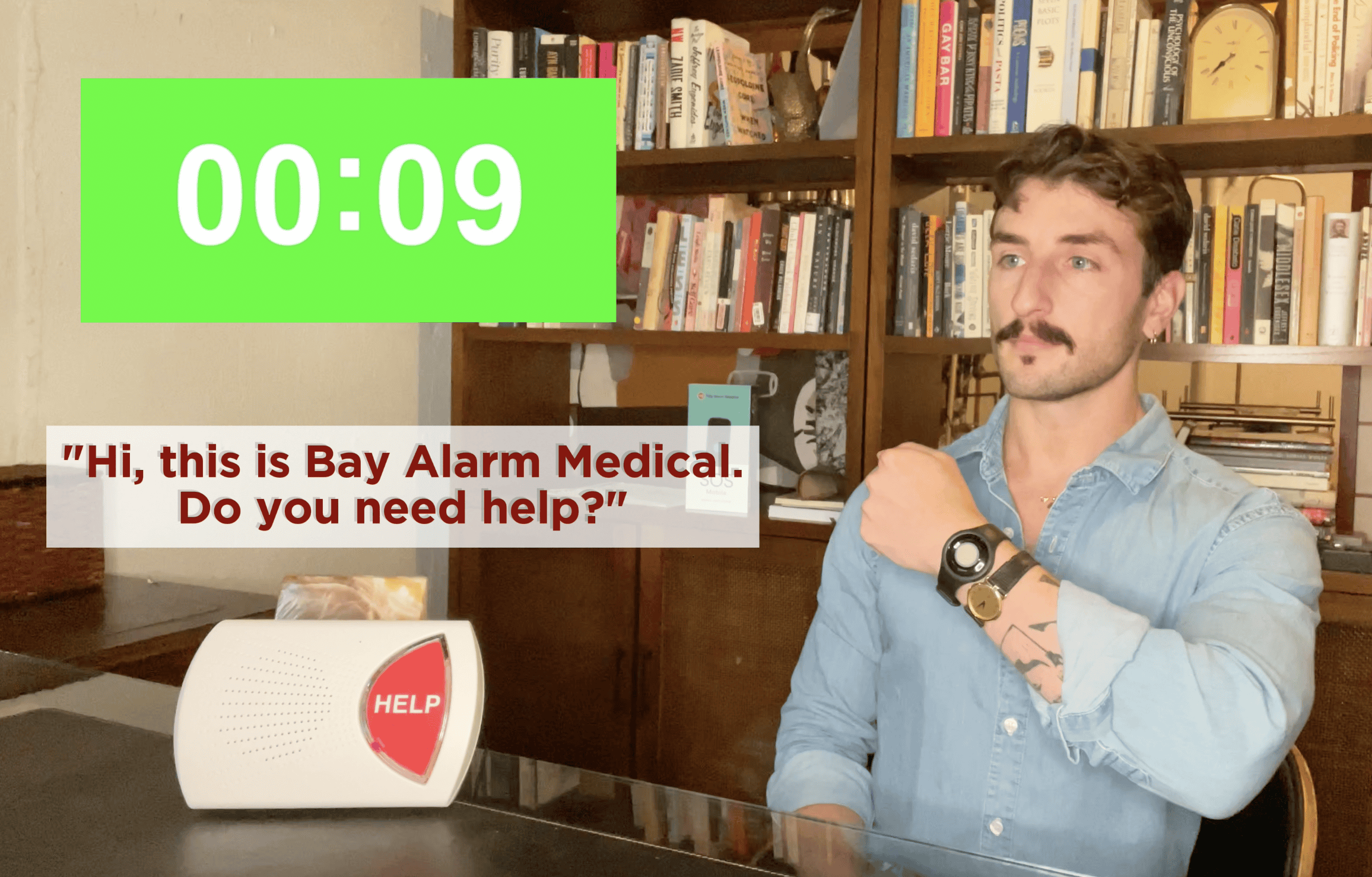
Bay Alarm Medical has long been one of our favorite providers of medical alert systems, and its latest iterations of bracelets live up to our high expectations. While the company has whittled down its lineup to four systems in recent years, each of its options performed exceptionally in our tests.
Currently, Bay Alarm Medical offers four bracelet options:
- SOS Home: This in-home system, available with either landline or cellular connections, is a standard medical alert device in which a bracelet help button connects the user with a stationary speakerphone.
- SOS All-In-One 2: This mobile system works just like the SOS Home. However, it features a portable speakerphone and cellular connection, which allowed us to take it outside of our home.
- SOS Smartwatch: This medical alert watch combines a help button, speakerphone, and even fall detection into a discreet smartwatch worn around the wrist. Currently, it’s one of our favorite medical alert watches.
- SOS Micro: This is a mobile bracelet with GPS and optional fall detection, but it doesn’t have as long battery life as the smartwatch.
Response Times
While each medical alert system from Bay Alarm Medical features slightly different mechanisms, they all gave us the same quick access to the company’s urgent response call center. In our 10 test calls with Bay Alarm bracelets, we were connected to help in an average of 16 seconds. This put them among the fastest systems on this list, beaten by only Medical Guardian and ADT.
Comfort and Durability
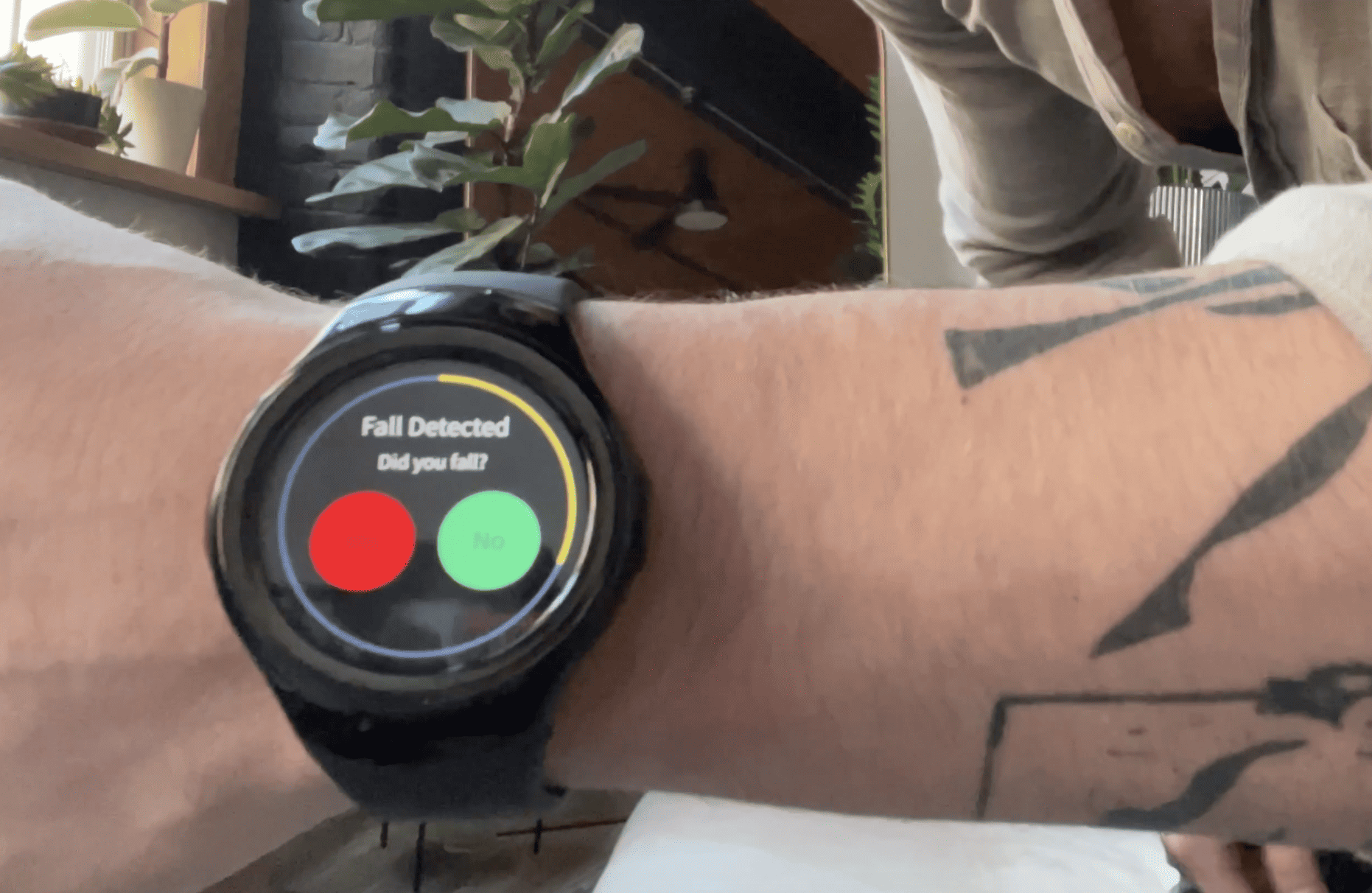
Bay Alarm Medical’s bracelets are made from durable rubber that is comfortable, albeit a bit unattractive in appearance. They are also rated IP67 in terms of water resistance, and when we took the bracelets into the shower, we noticed no impact on device performance.
Extra Features
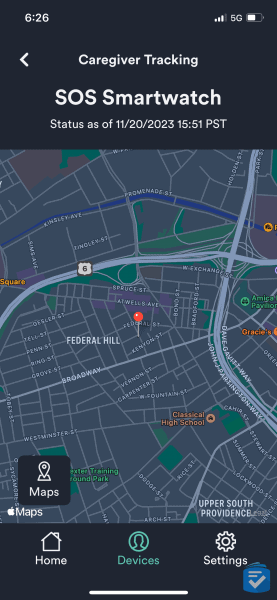
Bay Alarm Medical’s medical alert bracelets come with a variety of extra features, including GPS tracking, medication reminders, and geofencing. For example, when we placed an emergency call with our SOS Smartwatch, our loved ones could use the Bay Alarm Medical app to track the device’s location, a feature you won’t find on ADT’s systems.
Pricing
Bay Alarm Medical costs start at $24.95 per month. This makes it the second most affordable company on this list, after MobileHelp. Additionally, with Bay Alarm Medical, you can cancel your service at any time, send back your equipment, and stop making monthly payments. Compare this to Life Alert, which required us to lock into a three-year contract for its system.
Our Verdict
Affordable, comfortable, and capable of connecting us to help in an average of 16 seconds, Bay Alarm Medical has some of the best bracelet systems we’ve seen. For the majority of users, they’re going to be your best bet. The only exception would be for those who want more advanced caregiver tracking. In these instances, we’d recommend checking out Medical Guardian, detailed below.
To learn more about this company and its systems, check out my full review of Bay Alarm Medical.
Pros
- Large in-home coverage range
- Quick emergency response times
- Option of medical alert bracelets or pendants
- 30-day risk-free trial
- No activation fees on in-home systems
- Easy to add extra help buttons
Cons
- Small selection of mobile bracelets
- One-time equipment charges for mobile systems

2. Medical Guardian - Best Mobile Bracelet
What We Like Most:
- Large selection of bracelets
- Lightning-fast response times
- Accurate GPS units
- No long-term contract required
Overview
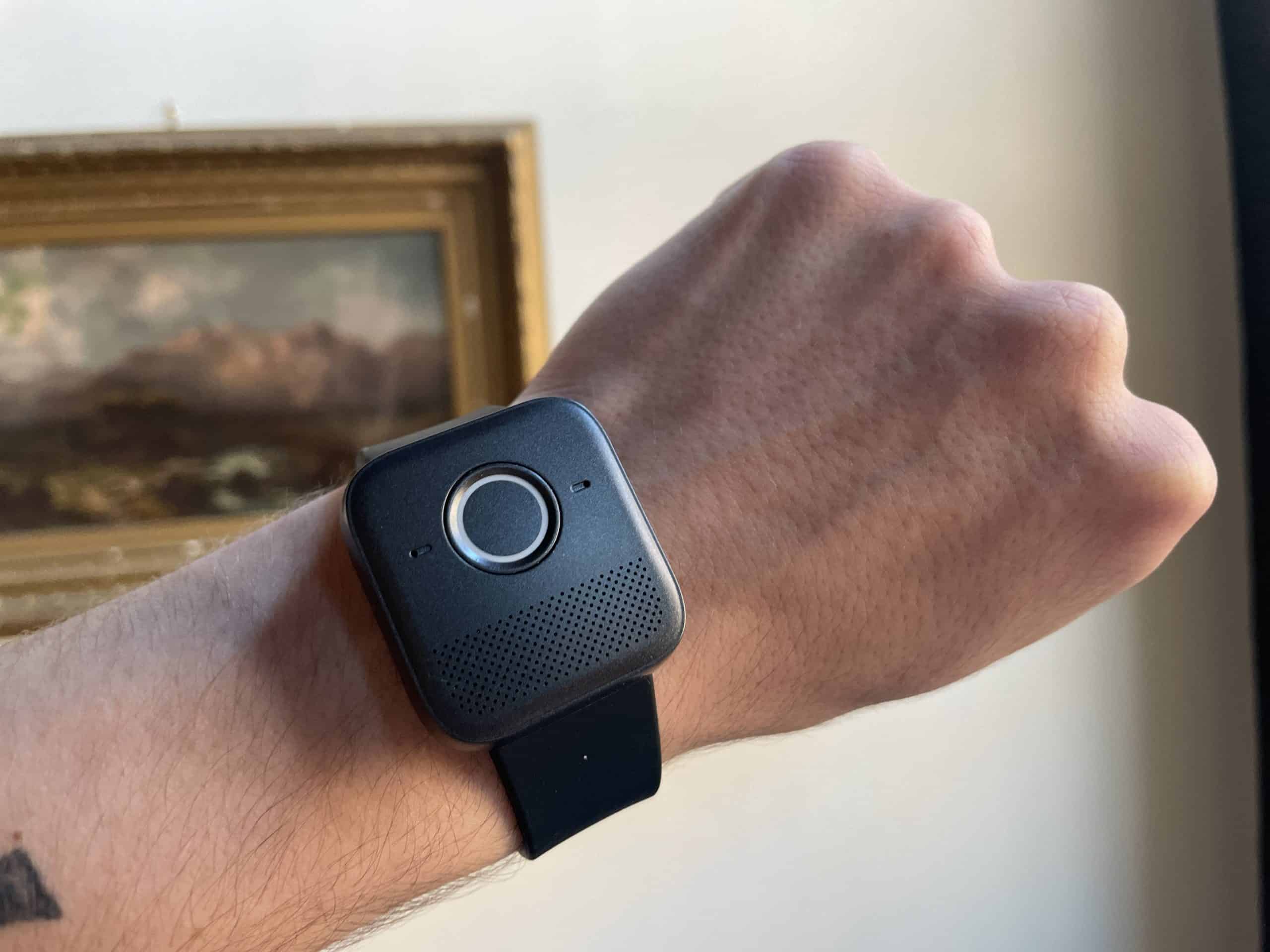
If you’re looking for a medical alert bracelet that can be worn both in and out of the house, then Medical Guardian is likely your best bet. Their MGMini Lite, in particular, is small, comfortable, and able to report the wearer’s location, even when outside the home.
>> Read more: MGMini Lite Review
Currently, Medical Guardian offers four medical alert bracelets:
- MGMini Lite: This mobile medical alert bracelet features a help button, a speakerphone, and GPS, all in one compact unit that fits on the wrist.
- MGMove: This medical alert watch combines urgent response features with the discreet profile of a smartwatch. It also has built-in messaging features that make it one of our top-rated smartwatches for seniors.
- MGHome Cellular: This in-home medical alert system uses a base unit connected to a bracelet that allows a user to call for help through its built-in cellular connection. It’s ideal for those who spend most of their time at home.
- MGHome Landline: This system functions the same as the MGHome Cellular; however, it uses an existing landline connection as opposed to a cellular connection.
Response Times

Hands-down, Medical Guardian consistently connected us to help faster than any other medical alert bracelet on this list. In-home and on the go, our Medical Guardian systems connected us to urgent response agents in an average of eight seconds. Even more impressive was the accuracy with which the mobile systems reported our GPS coordinates. In our calls with the MGMini Lite and MGMove watch, response agents were able to accurately report our location right down to the cross streets.
To see the smartwatch in action, check out our full MGMove review.
Comfort and Durability
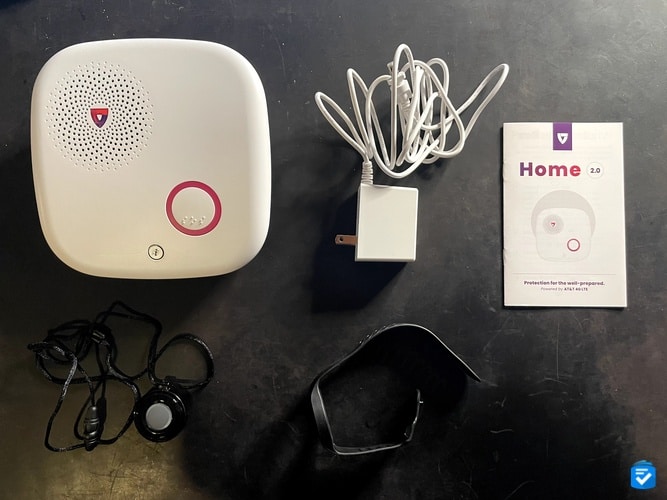
Medical Guardian’s bracelets were about as comfortable as the others on this list. Made from a durable rubber material, they were also water-resistant, allowing us to take them into the shower without causing damage. We’d give a special shoutout to the MGMini Lite, which at 1.4 by 1.5 inches, might just be the smallest medical alert system we’ve tested.
Extra Features
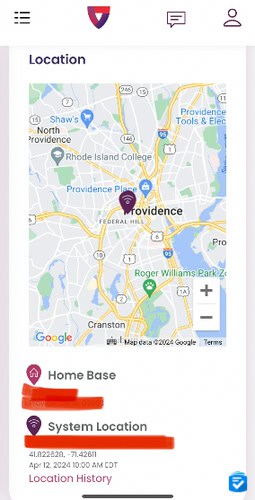
Medical Guardian excels when it comes to caregiver features. Whether you purchase one of its home or mobile systems, you’ll receive free access to the MyGuardian App. With this app, we could add loved ones to the caregiver portal, wherein they could track the location of our bracelet, receive alerts when we called for help, and—in the case of the MGMove—send messages directly to the system.
Pricing
Medical Guardian costs a bit more than the other companies on this list, and we’d argue this is the biggest caveat of its systems. Their systems start at $31.95 per month for the MGClassic. The MGMini Lite and the MGHome Cellular systems cost $46.95 and $39.95, respectively, while the MGMove costs $42.95 a month. Luckily, unlike Life Alert, Medical Guardian does not require a long-term contract, so you can cancel your service at any time and stop making monthly payments.
Our Verdict
While they are a bit more costly than those of other companies on this list, Medical Guardian’s bracelets connected us to help in the shortest time. Moreover, the company’s advanced app for caregivers is unrivaled in terms of functionality.
To learn more about this company and its systems, check out our full Medical Guardian review.
Pros
- Landline and cellular options
- Smartwatch option
- Accurate location tracking
- Fall detection available on most systems
- No long-term contract
- Free month of service with annual subscriptions
- Up to seven-day mobile battery life
Cons
- Occasional false alarms with fall detection
- Limited activity monitoring
- Higher prices
3. ADT - Best In-Home Bracelets
What We Like Most:
- Landline and cellular options
- Highly trained monitoring agents
- Accurate fall detection
- Home temperature monitoring
Overview
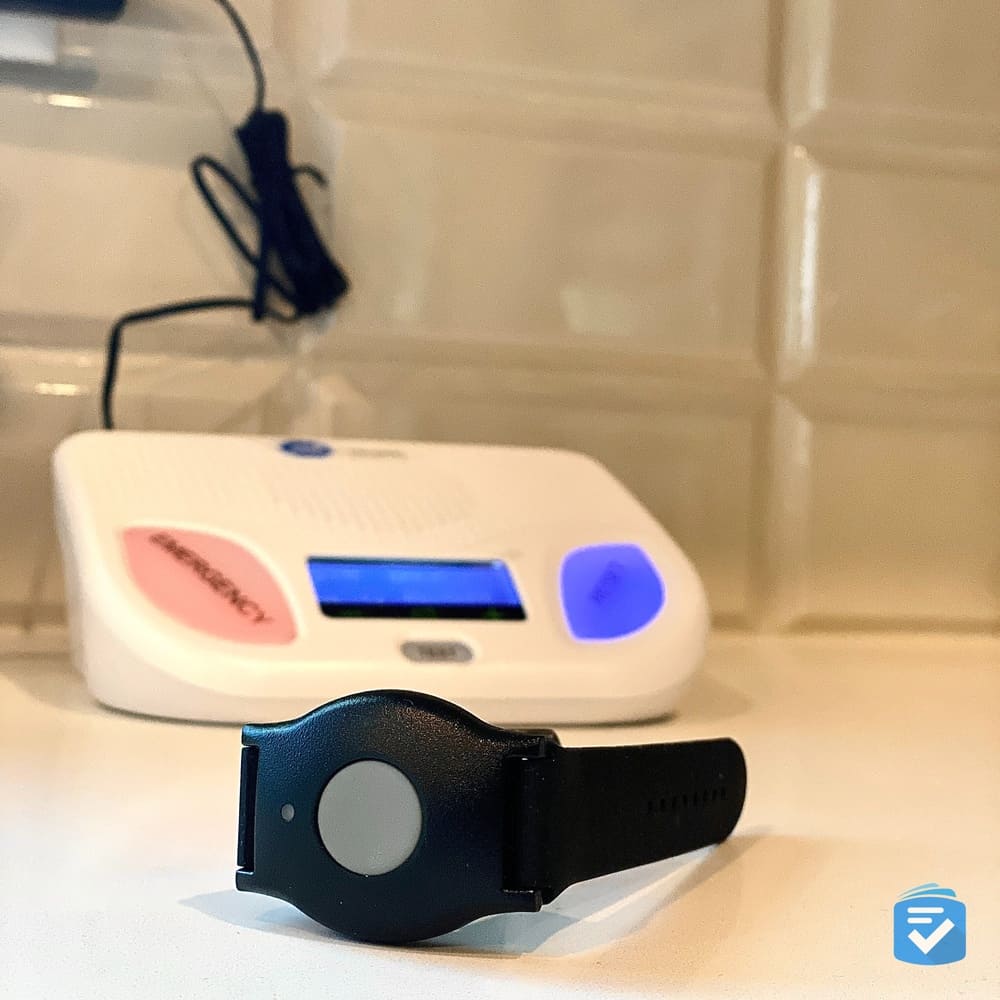
ADT has long been known as a top provider of home security systems, and its medical alert systems offer additional protections for older adults. In our tests, the company’s bracelets impressed us with their durability, comfort, and quick response times.
Currently, ADT offers three options with a bracelet:
- Medical Alert Basic: This basic landline system features a speakerphone base unit and a bracelet help button. While it does not support fall detection, it is compatible with additional bracelets for a one-time $15 charge for each of them.
- Medical Alert Plus: This system functions identically as the Basic, with two primary differences: It uses a cellular connection, and it’s compatible with automatic fall detection.
- On-The-Go: ADT’s only mobile system includes GPS and is available as a white or black wristband.
Response Times
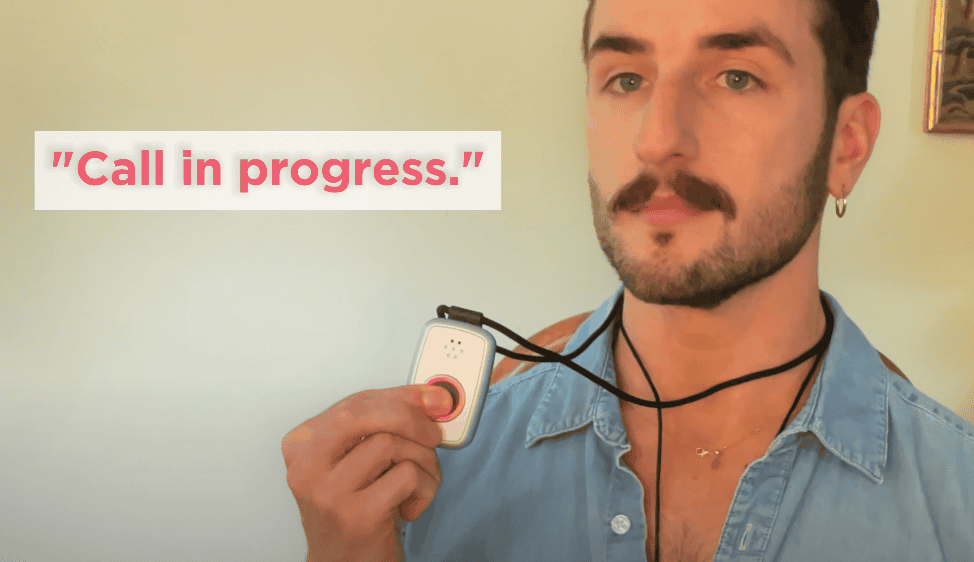
Across both ADT systems, we found consistently fast response times. In our 10 test calls with ADT bracelets, we were connected to help in an average of 14 seconds. This made it the second-fastest company on this list, second to only Medical Guardian.
Comfort and Durability
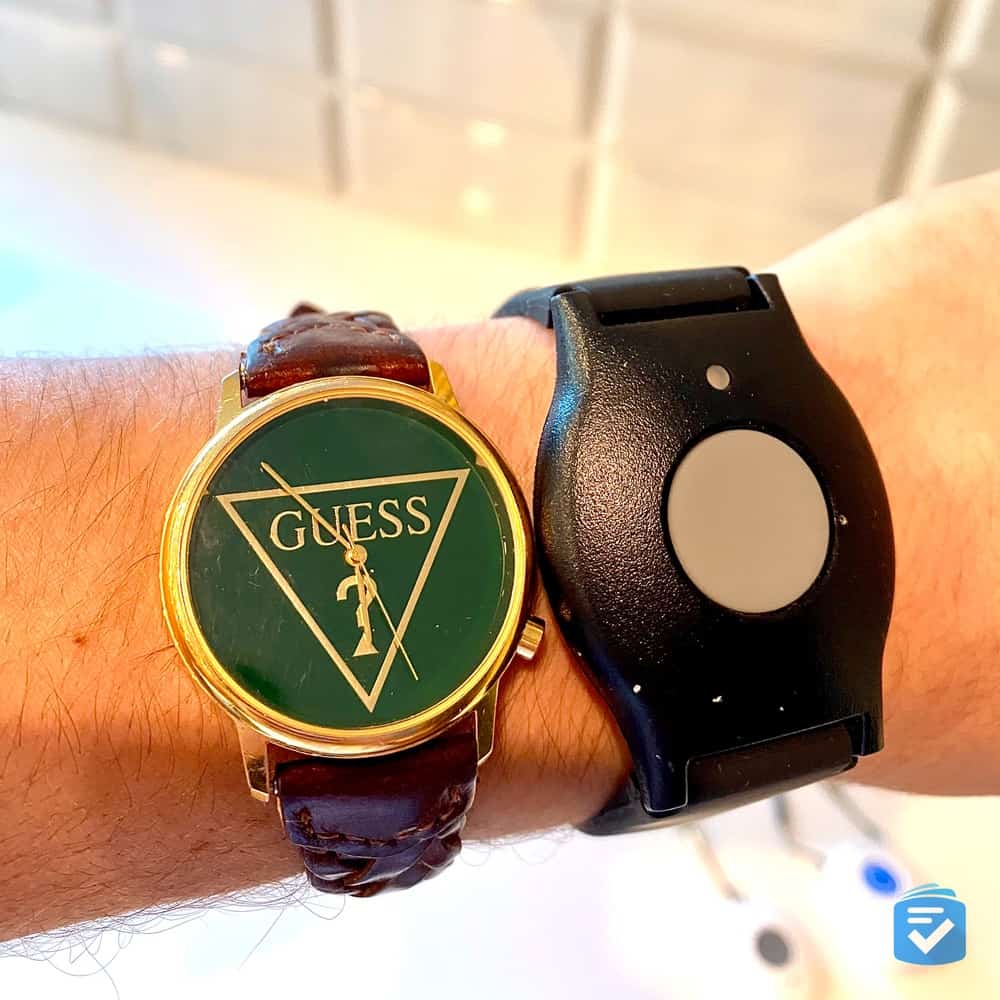
We were pleased by the durability of ADT’s bracelets on both systems. When dropped, our bracelets incurred no damage. When we wore them into the shower, we were pleased to find that the water did not affect their performance.
The one caveat is that the Medical Alert Basic bracelets are made of plastic. This made them somewhat uncomfortable to wear, especially compared to the rubber bracelets of the Medical Alert Plus system. That said, both performed without a hitch.
Extra Features
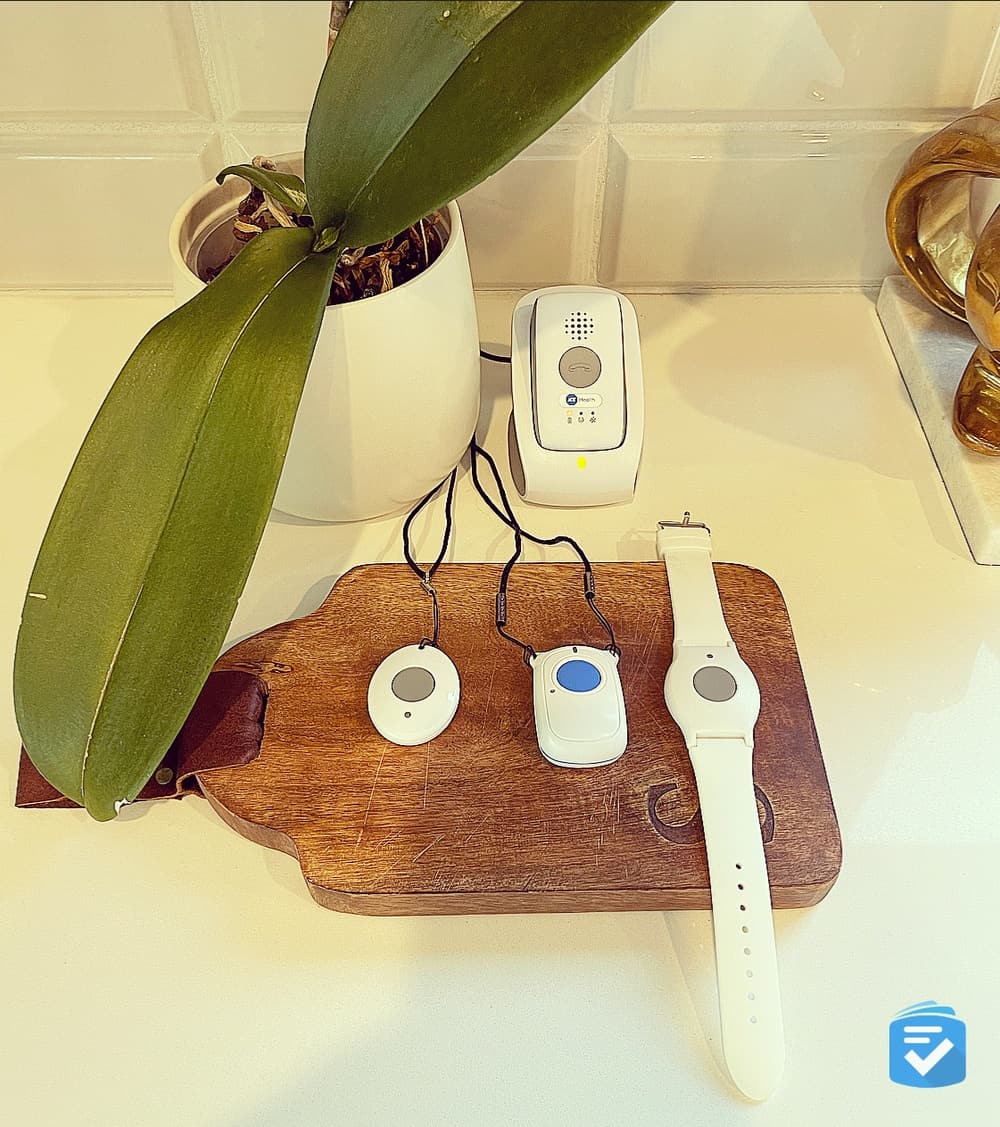
The biggest drawback to ADT’s bracelets would have to be the lack of extra features. Apart from fall detection, which costs an additional $11 per month, and home temperature monitoring, which alerts the monitoring center in the event of irregularly warm or cold home temperatures, ADT systems do little beyond the basic urgent response functions. If you’re looking for caregiver connectivity, then we’d recommend checking out Medical Guardian.
Pricing
ADT medical alert costs start at $31.99 per month for the home landline bracelet, $39.99 for the home cellular version, or $41.99 for the mobile version. Additionally, ADT requires a $99 activation fee on each system. If you pay for your service on an annual basis, you can get a slight discount on the monthly price of any system.
Our Verdict
While not as affordable or feature-rich as the other medical alert bracelets on this list, ADT’s medical alert bracelets are simple to use and reliable. To learn more about this company and its systems, check out our full ADT medical alert review.
Pros
- Large in-home coverage range
- Quick emergency response times
- Option of medical alert bracelets or pendants
- 30-day risk-free trial
- Discounts on bundled systems
- No activation fees on in-home systems
- Easy to add extra help buttons
Cons
- Pendant required for fall detection
- $99 activation fee
4. MobileHelp - Most Affordable Bracelets
What We Like Most:
- Systems from $24.95 per month
- Mobile and home options
- No long-term contract required
- Water-resistant bracelets
Overview
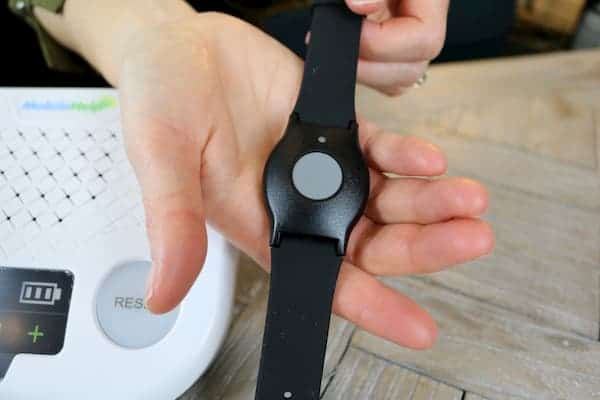
When it comes to combining affordability and reliability, no medical alert bracelet provider does it better than MobileHelp. At the time of this writing, its cellular systems start as low as $24.95 per month, making it one of the most budget-friendly options on this list.
While the company does not offer a mobile system with a bracelet, those seeking in-home protection will be satisfied by this company’s devices.
Response Times
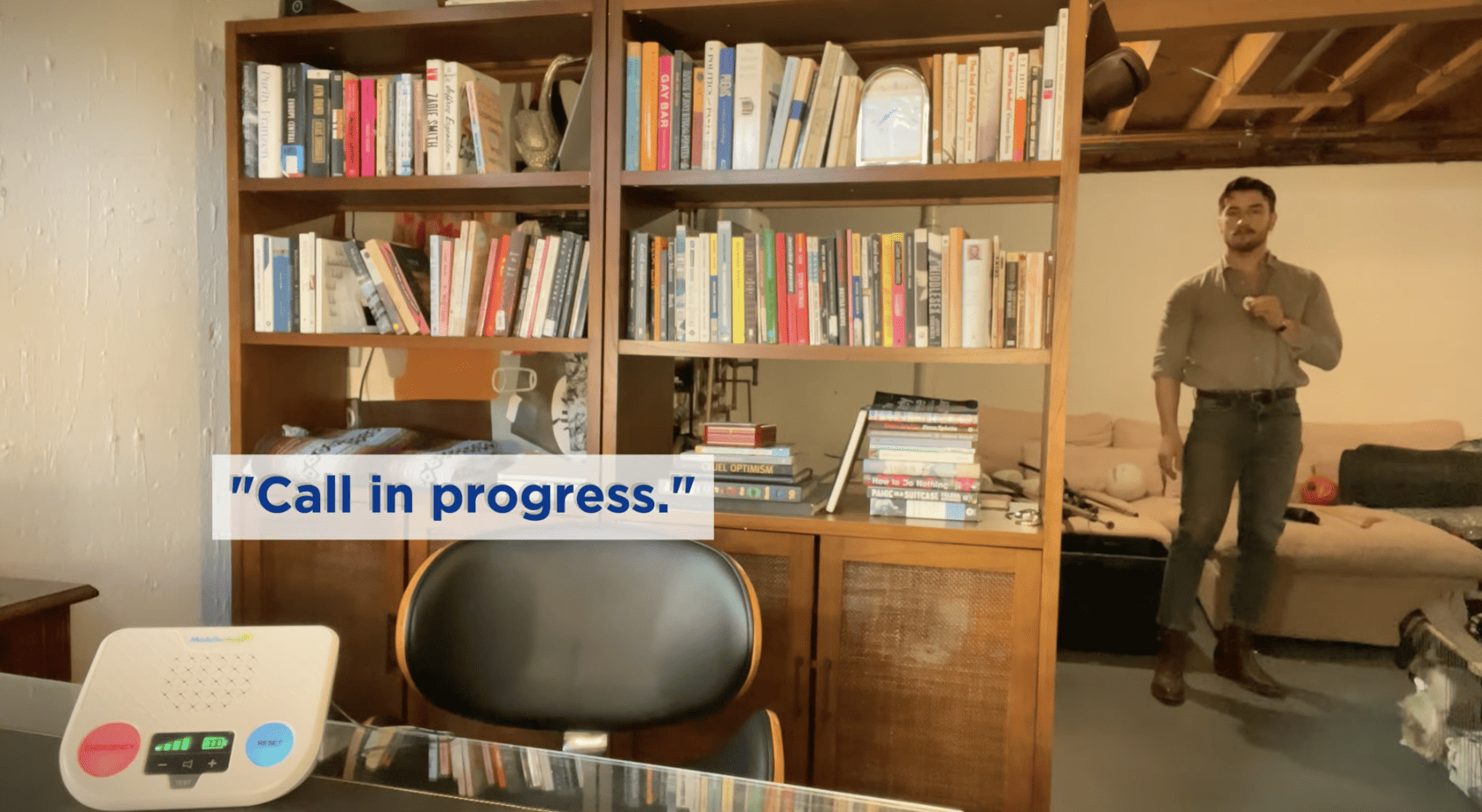
The primary downside of MobileHelp’s medical alert bracelets—particularly when compared to the other companies on this list—would have to be their response times. In our 10 test calls, our MobileHelp bracelets connected us to help in an average of 26 seconds. While this is still better than average, we should note that Medical Guardian’s bracelets connected us significantly faster.
Comfort and Durability
All of MobileHelp’s bracelets were comfortable for us to wear throughout the day. We should also note that, when wearing these devices in the shower, we noticed that the MobileHelp bracelets were particularly quick to dry.
Extra Features
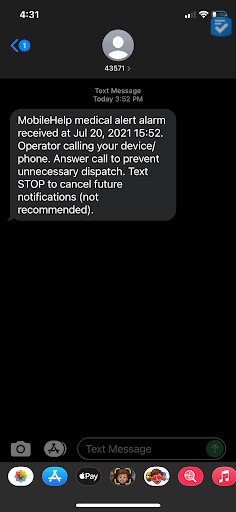
Compared to other medical alert companies, MobileHelp is pretty spare in terms of extra features. There is currently no caregiver app for MobileHelp systems, and there is no activity monitoring. That said, MobileHelp does offer features like OnGuard Alerts ($2.99 per month), which will automatically text loved ones when an emergency button is pressed.
Pricing
MobileHelp costs are impressively low. Both the company’s home systems (landline and cellular versions) cost $24.95 per month with no one-time activation or equipment fees.
While fall detection will cost an additional $11 per month (slightly more than the traditional $10 per month), its systems are still easily the most affordable on this list, tied with Bay Alarm Medical. Additionally, the company requires no long-term contract, meaning you can cancel your service at any time and stop making monthly payments.
Our Verdict
Although MobileHelp’s response times were not as fast as those of other bracelets on this list, they still averaged less than 30 seconds. This made them faster than systems like Life Alert. And for less than $25 per month, you won’t find any other system as trustworthy as MobileHelp.
To learn more about this company and its systems, check out my full MobileHelp review.
Pros
- Waterproof bracelets
- Low monthly costs
- No long-term contract required
- Extra help buttons available
Cons
- Extra fees for text alerts
- Slower response times
5. Life Alert - Best Customer Service

What We Like Most:
- Personalized customer service
- Long mobile battery life
- Cellular and landline options
- Durable, water-resistant buttons
Overview

Life Alert needs no introduction. Widely known for its popular commercials, the company’s name is synonymous with protection for loved ones in the event of a fall. That said, the company’s response times were frighteningly long in our tests, not to mention its deplorable policies on contracts.
Response Times
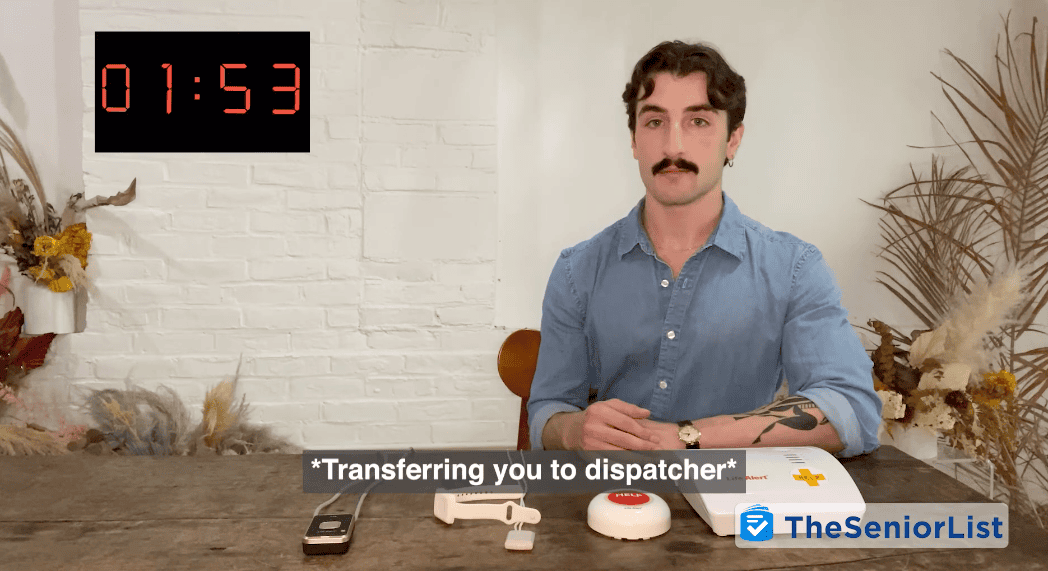
In our 10 test calls with both in-home and mobile systems from Life Alert, we found that response agents answered our calls in an average of 120 seconds. You read that correctly: 120 seconds! This is by far the longest response time of any system we’ve tested.
If this sounds too outlandish to be true, then we recommend reading our full Life Alert review, in which you’ll find our videos of several test calls.
Comfort and Durability
Life Alert’s medical alert bracelets were comfortable, as they seemed to be made from the same rubber material as those from other companies on this list. These bracelets are also fully waterproof. That said, Life Alert’s mobile system does not support a bracelet option.
Pricing
If you thought Life Alert’s response times were bad, you might be surprised to find its pricing is even worse. For its basic in-home system with the bracelet help button, you’ll be paying $49.95 per month, making it the most expensive bracelet on this list. On top of this, Life Alert requires all users to sign a three-year contract, one you can exit only through death or transition to round-the-clock care.
To learn more about Life Alert’s ridiculous pricing, read our full guide to Life Alert costs.
Extra Features
The one saving grace of Life Alert would have to be its approach to customer service. After purchasing my Life Alert bracelet, I was connected with a “care counselor.” This person, despite living across the country from me, shared her personal phone number with me and walked me through any questions I had about installing and using the device. She even offered practical advice with regard to caring for a parent. This is something I’d like to see from more medical alert companies.
Our Verdict
The best customer service in the world can’t make up for a flawed product. Like my mother always said: “You can put lipstick on a shoddy medical alert system, but it’s still not worth the money.” OK, she never said that, but you get the gist.
Unless you want to overpay for a system that will leave your loved one waiting minutes until someone answers their call, we’d advise against choosing Life Alert.
Pros
- Customized and compassionate customer service
- Easy installation and use
- Quick emergency response times
- Long-lasting batteries
Cons
- $49.95 minimum monthly price
- Three-year contract required
What Is a Life Alert Bracelet?
Medical alert bracelets (often called Life Alert bracelets) are wearable buttons that, when pressed, connect a user to a 24/7 Urgent Response call center. When a call center agent answers the call, they will arrange the proper help for the user, whether this means EMTs or a neighbor.
In this video, our managing editor, Ryan Molloy, walks you through how these devices work.
The Limits of Engraved Medical Bracelets
Engraved medical bracelets inform first responders and care staff if a wearer has a medical condition.2 Further, medical personnel may be permitted access to the wearer’s medical history for individuals who make their online health record available.
However, there are some things that engraved bracelets simply can’t do, such as:
- Alert someone to an emergency that’s in progress; seniors still need to call for help or have someone else do it
- Alert caregivers that something is wrong
- Let EMTs know where to find the wearer.
- Assess the situation to decide the best course of action (that would be a very smart bracelet!)
Once an EMT is on the scene, the bracelet draws their attention to an older adult’s medical history. But even the best medical alert bracelets don’t give seniors a way to get help or talk to someone if they need it. One of the downsides is that if you were unconscious or unable to talk, the engraved bracelets wouldn’t be able to detect this or help you get emergency assistance.
That’s why we think medical alerts that can be worn as bracelets are a much better idea.

Types of Medical Alert Bracelets
There are three types of medical alert systems that can be worn as bracelets:
- In-home medical alerts use a base station to connect to the call center and have a button that can be worn as a bracelet to summon help. These are typically small, round buttons that can be worn as either a pendant or around the wrist.
- Mobile medical alerts use GPS to work wherever there is a cellular connection. These are ideal for more active people. Some, but not all, mobile alerts can be worn on a wristband, although some may be too large for smaller wrists.
- Smartwatches for seniors are a newer development in the medical alert industry. They offer on-call protection, in addition to tracking your physical exercise, glucose levels, heart rate, and other health-related parameters.
Whether aging adults are active in their local community or spend most of their time at home, there’s a medical alert bracelet out there to suit them.
Bottom Line
These days, most companies offer a bracelet or pendant help button with their medical alert systems. Because of this, your main deciding factors will likely be response times and price. While response times may vary depending on your location and the time of day, pricing is worth considering before making a purchase unless you want to be locked into Life Alert’s three-year contracts.
How We Test Medical Alert Bracelets
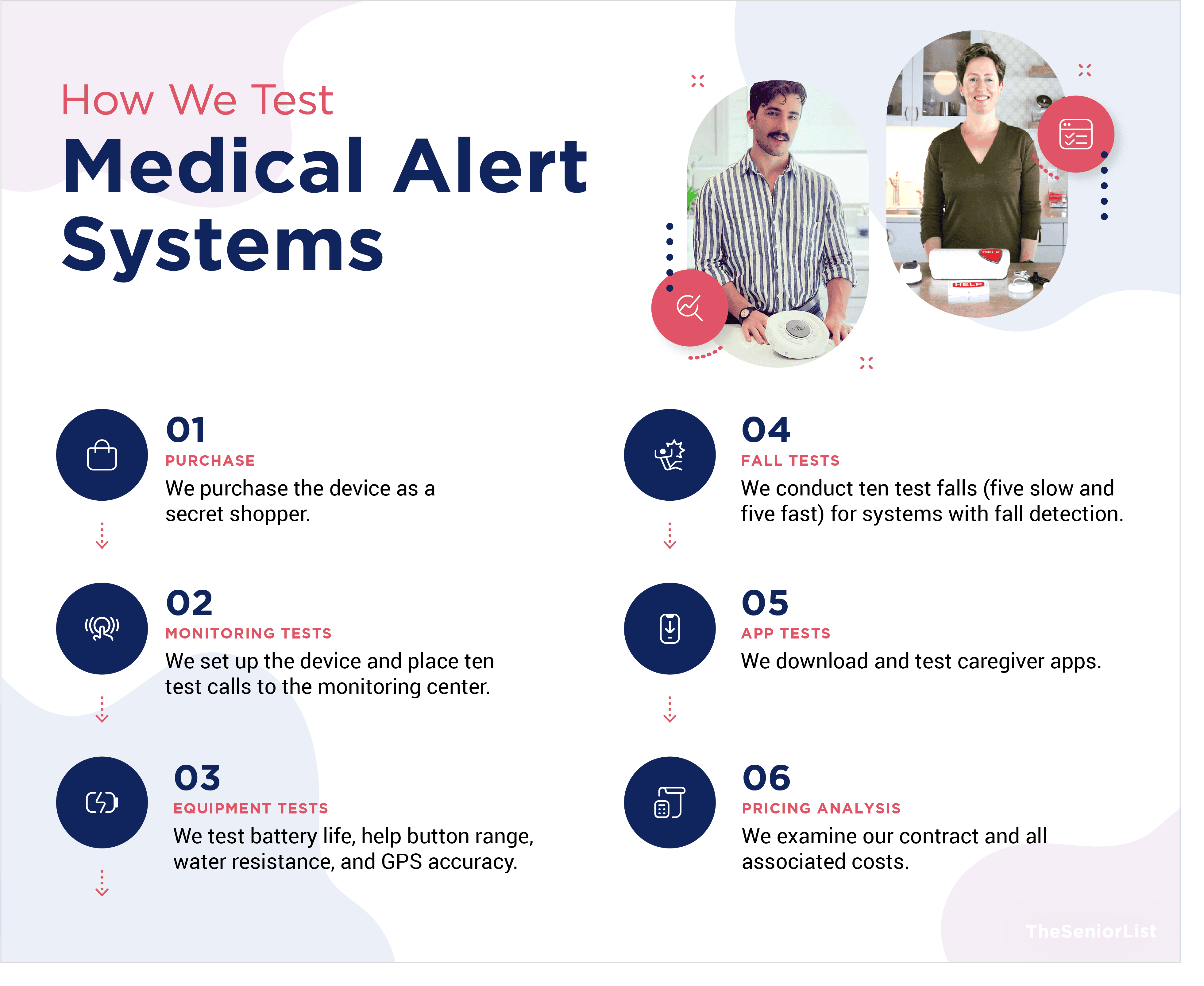
To create this list, we tested 14 medical alert bracelets from 12 different companies. We evaluated them based on the following criteria:
- Response time: For each medical alert bracelet, we placed 10 test calls and counted the time that passed before we were connected to a human response agent. We then calculated a mean average for each bracelet.
- Pricing: We looked for affordable medical alert bracelets from companies that won’t lock you into a long-term contract. All providers included on this list (except for Life Alert) offer month-to-month service agreements.
- Comfort and durability: Every medical alert bracelet should be comfortable enough to wear throughout the day. We also tested their water resistance to ensure they could be worn in the shower, which is a frequent site of falls.
- Extra features: We paid mind to extra features like caregiver apps, fall detection, and smartwatch bracelets.
Frequently Asked Questions
-
Do paramedics look for medical bracelets?
Yes. Paramedics will usually look for an engraved medical bracelet or any other type of wearable for medical history information.
-
How do I get a medical alert bracelet?
To get a medical alert bracelet, you can contact any medical alert provider and tell them you want a bracelet as opposed to a pendant.
-
Which medical alert bracelet is best?
If you’re looking for a traditional medical bracelet, it’s best to look into one that is waterproof and comfortable, allowing you to safely wear it at all times.
-
Are medical alert bracelets worth it?
Medical alert bracelets are a simple and affordable way to provide assistance in the event of an emergency, medical or otherwise. They can cost as little as $24.95 per month.





